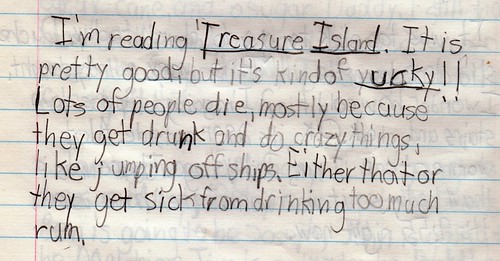 Something of a case in point: a childhood journal entry from the 80s, in which the pencil looks as clear as it did the day it was written, though the notebook wasn't always properly stored and the paper has seen better days.
Something of a case in point: a childhood journal entry from the 80s, in which the pencil looks as clear as it did the day it was written, though the notebook wasn't always properly stored and the paper has seen better days.
If you'll allow me to go off on a mini rant for a moment here...occasionally I find myself wandering pen forums and get cranky at certain misconceptions.
Note to the Internet: STANDARD GRAPHITE PENCIL DOES NOT FADE.
It's graphite. It is, essentially, powdered rock. You could stick a lump of graphite out in the sun for a thousand years, and it's not going to bleach white.
Pencil *can* smear, of course. Especially if you're using rather soft pencil. If you have very soft pencil on a page that is constantly exposed to friction of some kind, you may end up with smudged, illegible writing. This is entirely different from fading.
Thank you. I feel better now. Carry on.

7 comments:
I guess longevity depends on storage, and the paper and ink quality. I have read some really old (like over 100years old) journals that were done in fountain pen and except for some yellowing of some of the paper they are quite nice and clear.
Pencil for the most part is perhaps the best. I imagine some of the more permanent gel/roller pen ink may not fade and smear, but old run-of-the-mill ball point ink is terrible. Long live the fountain pen and good ink! (and typewriters of course)
I got pretty badly burned by my first fountain pen journaling experience, so I'm always a little nervous about fountain pen inks. I'm pretty sure washable inks are by far the worst for fading, but any standard dye ink *could* be susceptible to fading to some extent, if not so dramatically as I experienced.
Some of the time I tell myself I don't care if my journals are legible far in the future anyway. Some of the time I tell myself most inks will probably last at least most of my lifetime, and that should be good enough. Some of the time I just use pencil, since I know I can count on it. And some of the time I use dip pens and the seriously permanent inks available for them. Could be someday the pencil and dip nib entries will be the only ones still standing...
What was that old chestnut about the difference in space programs? The USA spent much effort and money developing the Space Pen, and the Russians used a pencil.
I have a facsimile of the notated "Christmas Carol" (got it from Levengers)that Dickens used for public readings when on tour. His notes were done in roughly three phases, two in ink and one, the oldest set, in pencil. This was circa 1850. The penciled notes are by far the least obscured even after decades of use. So much for the canard about pencil fading.
I believe fountain pen inks, like Noodlers, have improved. But if REALLY long term retention is a factor, give me good pencils, dip pens and serious ink. (Now I just have to write or draw something worth that concern.)
Jeff The Bear
THANK YOU for posting this!
Microns are supposed to be pretty indestructible, ink-wise. But they are a little...boring compared to fragrant pencils that need sharpening.
I've been enjoying some "harder" German pencils lately, with very smear-resistant leads. Perfect for long-term writing. :)
New, super-material graphene is just a one-atom-thick skin of pencil lead, hardly different to the trace it leaves on paper - just thinner and more consistent. The guy who 'discovered' it was scribbling with a pencil at the time. So, I'd say a pencil is a fairly 'now' sort of medium. And isn't Treasure Island one of the best books ever?
Huh...graphene wasn't a word I was familiar with, so I had to go do some reading. This was about the most intelligible of the potential applications (from my ignorant layman perspective). Hmm...interesting!
My second thought, however, was to wonder if they're going to steal all our lovely pencil graphite to make cell phone bits. Does this mean I have an utterly valid excuse to buy a full gross of, say, the Musgrave Test Scoring pencils before it's too late?
Oh, and yes, Treasure Island is still a favorite! Even with the yucky parts. (Which I believe I was more fascinated by than I wanted to admit, so I covered my fascination with "ewwww!") There's a reason it's been made into movies about a gazillion times.
Post a Comment